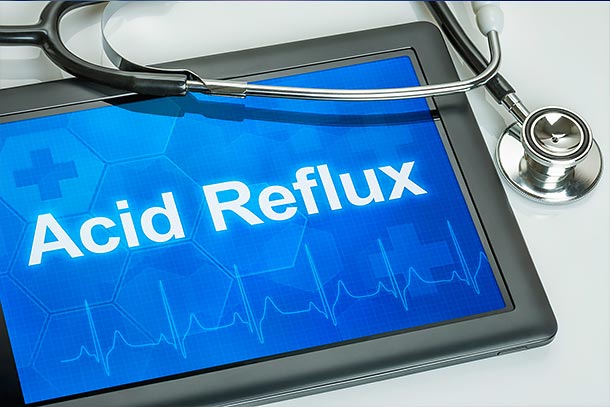Reflux Center for Heartburn, GERD
If you have persistent heartburn or acid reflux, the Comprehensive Reflux Center at Centennial Hills Hospital Medical Center can help you reduce chronic heartburn and chest or throat discomfort. Treatment is available for a variety of disorders including chronic heartburn, Barrett's esophagus and gastroesophageal reflux disease (GERD) or acid reflux disease.
GERD Explained
GERD, or gastroesophageal reflux disease, affects millions of Americans and occurs when stomach acid or intestinal bile leaks from the stomach into the esophagus. This process is known as acid reflux and can cause heartburn and irritate the esophagus. Prolonged acid reflux can cause chronic inflammation of the esophagus and can lead to serious health problems including a condition known as Barrett's esophagus. In this condition, the lining of the esophagus changes to resemble the lining of the stomach. While there are no symptoms of Barrett's esophagus, the condition has been linked to cancer of the esophagus. The Comprehensive Reflux Center can examine your esophagus for precancerous cells and offer early treatment options if necessary. Take the GERD Self-Assessment >
GERD Symptoms
Heartburn is the most common symptom of GERD. Other symptoms can include:
- Sore throat
- Belching
- Hoarseness
- Regurgitation
- Asthma-like symptoms
- Chest pain or discomfort
- Coughing
- Burning in the throat or mouth
- Bloating
GERD can affect anyone, including infants and children. If you have chronic heartburn or are experiencing any of the above symptoms, you may have GERD.
Learn about treatment options below.
GERD Treatment Options
Centennial Hills Hospital Medical Center gastroenterologists use a variety of treatment options. Medication is the most common treatment, and diet and lifestyle changes may also be used. Often times, people can improve their symptoms by avoiding alcohol and spicy, greasy or fatty foods. Other tips to avoid heartburn include eating smaller meals, avoiding meals near bedtime and losing weight if necessary. Over-the-counter medications can also be used for relief.
Procedures are also available that enable doctors to help diagnose and treat GERD and other gastrointestinal conditions. Treatments include:
- Manometry to measure muscle contractions in the esophagus and evaluate whether more invasive treatment is needed.
- Radio frequency ablation (RFA), which is an endoscopic procedure to treat Barrett's esophagus and reduce its progression.
- Reflux pH and impedance to detect acid reflux by measuring the amount of liquid or acid in the esophagus during normal activities.
- Endoscopic ultrasound helps assess digestive disease by using high-frequency sound waves that produce detailed images of the lining and walls of the digestive tract.
- Pillcam/capsule endoscopy, which is a minimally invasive procedure used to detect diseases of the small bowel including Crohn's disease.
- Spyglass provides direct visualization of bile-duct quadrants for diagnosis and treatment.
- Endoscopic retrograde cholangiopancreatography (ERCP), which is a procedure that combines upper gastrointestinal endoscopy and X-rays to treat conditions of the bile and pancreatic ducts.
- Transoral incisionless fundoplication (TIF), a non-surgical procedure that offers relief from acid reflux without surgical incisions (see below).
Transoral Incisionless Fundoplication (TIF)
Transoral Incisionless Fundoplication (TIF) is a procedure in which surgeons insert a device equipped with a small camera through the mouth and toward the stomach. General anesthesia is required, and most patients are able to return home the next day; they can usually return to work and most normal activities within a few days.
During the procedure, surgeons manipulate the device to make and fasten several folds of tissue (plications) and create an anti-reflux valve at the connection of the stomach and esophagus. After two years, the majority of TIF patients are able to return to eating foods that they could not previously tolerate, and are able to stop taking medication.
Patients suffering from GERD are candidates for TIF if they:
- Regularly experience troublesome symptoms of GERD
- No longer respond adequately to pharmaceutical therapies
- Are concerned about the long-term effects of taking PPIs (proton pump inhibitors)
- Are considering surgery but are concerned about complication and potential side effects of laparoscopic antireflux surgery
Benefits of TIF include:
- No external skin incisions or scarring
- No internal cutting leading to a more rapid recovery
- Does not limit future treatment options
- Can be revised if required.
Call our Comprehensive Reflux Center patient information line at 702-835-9857 with questions or to make an appointment. If you need a referral to a gastroenterologist at Centennial Hills Hospital Medical Center, contact our free physician referral service at 702-388-4888.

